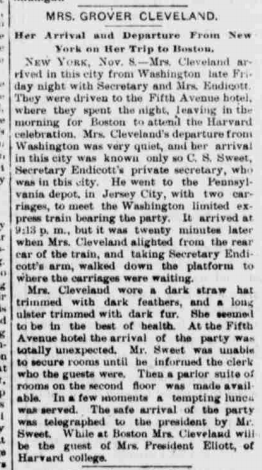THE NEW SORRENTO - PART 4
While Charles H. Lewis concentrated on his plans to develop Sorrento during the Summer of 1886, it was reported that Frank Jones, the Portsmouth NH Ale Brewer and industrialist, was cruising near Bar Harbor with his friend Samuel C. Lawrence. They were aboard Lawrence's steam yacht the Ibis. Lawrence was the head of his family's Medford, MA-based distillery, Daniel Lawrence & Sons which had been producing rum since 1824.
Frank Jones was the owner of the New Hampshire brewery bearing his name, which at the time was the largest producer of ale in the country. Jones had many other business interests in addition to his breweries in Boston and Portsmouth, including factories, hotels, and real estate ventures. Both Jones and his friend Lawrence were deeply involved in politics. Jones had served in Congress in the late 1870s and had been nominated for Governor of NH in 1880. Lawrence would later serve as the first mayor of Medford, MA.
Jones and Lawrence also had investments in new England railroad lines. Together, both men held large stakes in the Eastern Rail Road line and served as directors. When the line was leased to the Boston & Maine in 1884, Lawrence and Jones joined the B&M as directors.
The Eastern RR had routes throughout New England and the merger with the B&M would provide it with further connections to a larger railroad network, including those that terminated at Mount Desert Ferry in Maine.
Two years earlier, the Democratic Party had nominated Grover Cleveland, then Governor of NY, as its presidential candidate in the election of 1884. Cleveland defeated Maine Senator, Republican James Blaine, by a slim margin of the popular vote and by 37 electoral college votes. It had been a bruising campaign with rumors of Cleveland fathering a child out of wedlock and Blaine's alleged history of graft. This election was notable for another reason. The Equal Rights Party nominated as its candidate Washington DC attorney Belva Ann Lockwood. Although she could not cast a ballot, Lockwood was the first woman to run a full candidacy for US President and was quoted as saying "I cannot vote but I can be voted for."
Following the election, there were stories printed in the NH press that Jones would be named Secretary of the Navy by President Cleveland. Either he was not nominated or chose to not take the cabinet post, which went instead to William C. Whitney.
A year after his defeat, James Blaine purchased land on Highbrook Road in Bar Harbor and built a summer home he named "Stanwood Cottage" for his wife, Harriet Stanwood Blaine.
In the late 1800s, before personal income taxes were imposed, excise taxes on liquor in the United States comprised up to 25% of all federal revenues. Brewers and distillers were a powerful force in this era and commanded the ear of politicians -- Jones was no different. There were allegations that he and a few other influential Democratic businessmen had bankrolled Cleveland's presidential run and as a result would have a great deal of influence in his administration.
Indeed, Jones was so friendly with Cleveland that in early November of 1886, while passing through Washington DC, he and one of his lawyers Parker C. Chandler, were at the White House having dinner with the President.
That same weekend, Mrs. Cleveland traveled to Boston accompanied by the Secretary of War, William Endicott, and his wife, to be the guest of the President of Harvard, Samuel Eliot.
At the end of the Summer in 1886, Charles H. Lewis enticed a reporter to promote his new Maine resort with a special article detailing the goings-on at Sorrento. It was written, no doubt to attract readers to come and visit his new retreat on the coast of Maine the next year.
This article, with no byline, was published on the last day of August and ran on page 5 in the Boston Daily Globe. It recounts how, while sitting on a porch at a hotel in Bar Harbor, the correspondent is asked by one Mollie Merriweather to chaperone a picnic party across the bay to Waukeag Neck.
Her report is filled with details of the work being done to develop the Sorrento resort and the building of new cottages. Lewis seeded the piece with details about improvements in the town with the writer exclaiming that "...there seems no obstacle in the way of building up an American Sorrento that shall rival the fair Italian city." The article ends with the group departing Sorrento at the end of the day with the sun setting and giving a "varsity cheer" for The New Sorrento -- indeed it seemed that prospects for Lewis' new resort the next year looked more than promising.













No comments:
Post a Comment